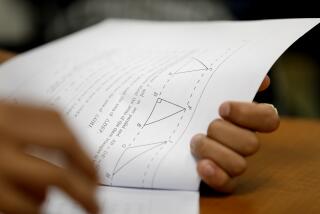Apprenticeship, High School Programs
- Share via
Re: “High School--If You Earn It,” by Carol Jago, Commentary, May 28: When I finished a tool-and-die-making apprenticeship at Buick Motor Division, Flint, Mich., in 1960, I had completed courses in advanced algebra, advanced projection geometry and trigonometry as well as other related studies. Before being accepted for enrollment, a transcript of my high school grades was necessary. My fellow apprentices and I spent many all-night sessions completing the associated homework, while working full-time.
Now, in addition to being able to operate all types of machines and accessories, using measuring instruments ranging from rulers and calipers to micrometers and microscopes, graduates are also required to know CNC machining and programming. Good communication skills are a necessity as well. There is a shortage of journeymen and journeywomen in all skilled trades, including the construction trades, who are able to perform the math and other technical requirements needed every day to satisfactorily do the work. To suggest that young people who couldn’t qualify for high school could even meet the entry-level requirements for an apprenticeship is absurd, and demeaning to those who have served and are serving appren- ticeships.
JIM McALPIN
Chino
* It’s not often one reads an article confronting the real problem with American K-12 education. Basically, American students don’t work hard enough. Jago has brilliantly pinpointed the crisis teachers face. Clearly, the system requires nothing of our students and that’s exactly what we get in return from too many. Why should we be surprised when students are allowed to fail an overwhelming majority of their middle school classes and then come to high school knowing next to nothing?
Anyone with common sense knows a good education is primarily a function of study in order to master knowledge and skills. A system of exams with consequences must be instituted, maximizing student effort, protecting taxpayer investment in education and producing the system necessary to move many of our children out of poverty.
Instead, the romantics who control public education envision a utopian system where school will be so interesting and fun that kids can’t help but study. Not likely.
DAN HART
HERB ROSENBLOOM
Math Teachers
San Fernando High School
* Jago is absolutely accurate with her assessment of public education and how to improve it. Her statement, “A few might even begin to realize that free public education is a privilege,” summarizes an attitude that parents would do well to adopt as a theme to instill in their children.
R.C. COLE
Long Beach






